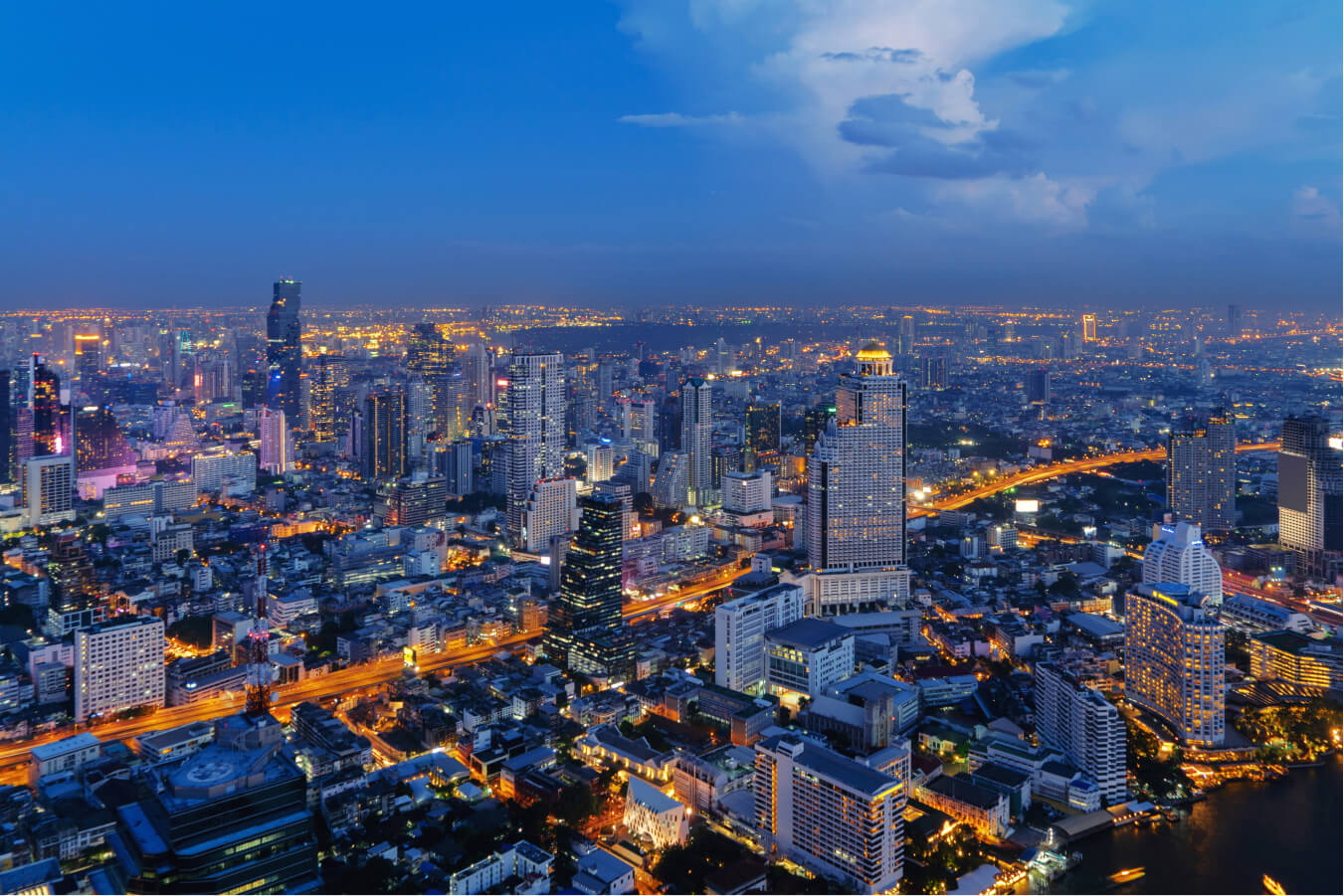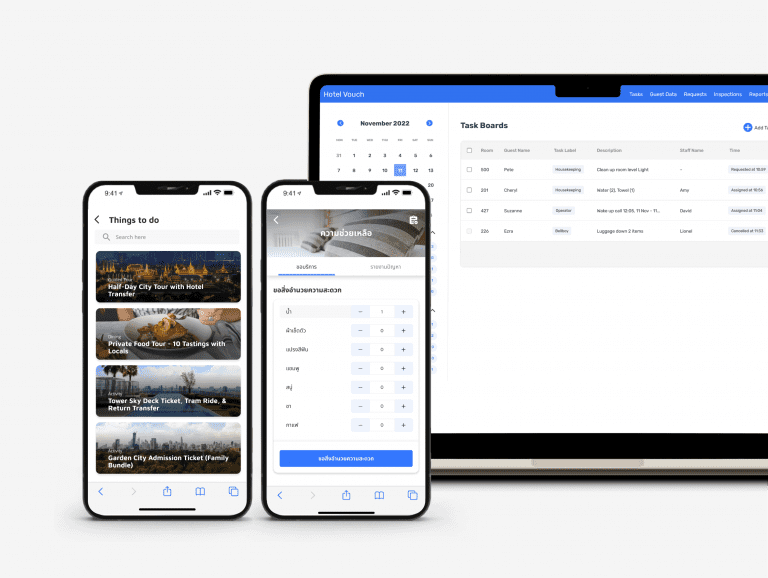
Latest Tech Trends for Thailand Hotels in 2023
Thailand closed out the year of 2022 with over 10 million foreign arrivals, just as the Tourism Authority of Thailand has targeted in its recovery plan. This better-than-expected number has signaled a strong and positive start to 2023, which the Thai government expects arrivals to double to 20 million.
So much is to be expected in 2023, yet the hotel industry is still facing the aftermath of the pandemic which has rocked hospitality to its core. So, what are the types of technology that hotels in Thailand should pay attention to in 2023? This article discusses three of the biggest challenges faced by Thai hotels and the technologies that endeavor to resolve them.
1. Productivity Optimisation
The COVID-19 pandemic has greatly affected the hotel industry in Thailand. Due to disruptions in the country’s manpower situation, hotels that have remained resilient are operating at reduced capacity. The sudden influx of tourists had hotels panic hiring to fulfill operational needs, but it was soon apparent that the majority of labour with relevant experience have left the industry during the pandemic to “safer” sectors.
Hotels now face the challenge of managing operations with unskilled manpower and a potential issue is that it can lead to lower productivity and quality of work. Especially for roles that directly affect experiences and interactions, hotels could suffer if the impact took a negative turn on guests caused by inexperience.
Instead of hiring more staff, hotels should consider boosting productivity of their own pool of talented staff. Empowering them with the right tools to reduce inefficiencies and spend more hours working on impactful tasks. Automating workflows and processes with productivity tools could be the critical first step.
Some examples of how productivity optimisation tools improve efficiency of hotels:
- Task management system to keep track of the department’s ongoing tasks and give supervisors a clear overview for better prioritisation and speedier response.
- Monitoring of how much time is spent on each task and identify areas where the team members can be more efficient.
- Tools that automate repetitive work and enable tasks that impact guest satisfaction to be completed better and quicker.
- Digitalising to allow guests to self-service for simple requests and queries on a smart and intuitive guest experience platform.
2. Becoming Sustainable
With accelerating concerns over the climate crisis around the world, hotels in Thailand are under immense pressure to be more sustainable in their daily operations. Even end consumers, hotel guests, are chiming in in a research, with 88% of global travelers saying they want brands to help them improve their environmental and social footprint.
How then should hotels begin their sustainability campaign while reducing costs and not complicating operations?
Here are what some leading hotels are doing, with the help of technology:
- Remove physical printed compendiums in every room and replace it with a digital solution that is accessible via guests’ mobile phones.
- In-room dining and restaurant menus are digitalised with direct ordering available on devices.
- Offer guests the option to choose the level of cleaning services on a digital platform instead of defaulting to full room make up daily.
- Digitalise operational processes to reduce the need for paper usage.
3. Overcoming Language Barriers
As many travelers do not speak Thai, language differences can be a factor that disrupts the guest experience. Hotels are constantly hiring guest service staff that speak the languages of top demographic guests, but these hires are rare to find and can cost much more than employing locals.
Technology has played a huge role in alleviating the problem. Hotels that are digitalising know that guest facing platforms with multi language capabilities are a big help in improving communications between hotel and guest. A well-built guest platform would be able to display accurately translated content in multiple foreign languages such as Chinese / Mandarin, Russian, Japanese and Korean. This allows a clear and simple channel to get hotel information, place service requests and even in-room dining orders in their language, preventing miscommunications that might occur if done over a phone call.
Besides a more seamless stay experience, overcoming the language barrier could result in unexpected benefits. One of our hotel partners witnessed an increase in F&B orders from Chinese tourists since the implementation of Mandarin language to their food ordering platform.

All-in-one Award-winning Tech Solution Provider
If your hotel is looking for the technologies mentioned above, Vouch is here to help. We are happy to share our experience on working with Thailand hotels to elevate guest experience through our digital solutions such as digital housekeeping services, contactless dining and digital compendium.
Contact our business development team for a demonstration!

Latest Tech Trends for Thailand Hotels in 2023
Thailand closed out the year of 2022 with over 10 million foreign arrivals, just as the Tourism Authority of Thailand has targeted in its recovery plan. This better-than-expected number has signaled a strong and positive start to 2023, which the Thai government expects arrivals to double to 20 million.
So much is to be expected in 2023, yet the hotel industry is still facing the aftermath of the pandemic which has rocked hospitality to its core. So, what are the types of technology that hotels in Thailand should pay attention to in 2023? This article discusses three of the biggest challenges faced by Thai hotels and the technologies that endeavor to resolve them.
1. Productivity Optimisation
The COVID-19 pandemic has greatly affected the hotel industry in Thailand. Due to disruptions in the country’s manpower situation, hotels that have remained resilient are operating at reduced capacity. The sudden influx of tourists had hotels panic hiring to fulfill operational needs, but it was soon apparent that the majority of labour with relevant experience have left the industry during the pandemic to “safer” sectors.
Hotels now face the challenge of managing operations with unskilled manpower and a potential issue is that it can lead to lower productivity and quality of work. Especially for roles that directly affect experiences and interactions, hotels could suffer if the impact took a negative turn on guests caused by inexperience.
Instead of hiring more staff, hotels should consider boosting productivity of their own pool of talented staff. Empowering them with the right tools to reduce inefficiencies and spend more hours working on impactful tasks. Automating workflows and processes with productivity tools could be the critical first step.
Some examples of how productivity optimisation tools improve efficiency of hotels:
- Task management system to keep track of the department’s ongoing tasks and give supervisors a clear overview for better prioritisation and speedier response.
- Monitoring of how much time is spent on each task and identify areas where the team members can be more efficient.
- Tools that automate repetitive work and enable tasks that impact guest satisfaction to be completed better and quicker.
- Digitalising to allow guests to self-service for simple requests and queries on a smart and intuitive guest experience platform.
2. Becoming Sustainable
With accelerating concerns over the climate crisis around the world, hotels in Thailand are under immense pressure to be more sustainable in their daily operations. Even end consumers, hotel guests, are chiming in in a research, with 88% of global travelers saying they want brands to help them improve their environmental and social footprint.
How then should hotels begin their sustainability campaign while reducing costs and not complicating operations?
Here are what some leading hotels are doing, with the help of technology:
- Remove physical printed compendiums in every room and replace it with a digital solution that is accessible via guests’ mobile phones.
- In-room dining and restaurant menus are digitalised with direct ordering available on devices.
- Offer guests the option to choose the level of cleaning services on a digital platform instead of defaulting to full room make up daily.
- Digitalise operational processes to reduce the need for paper usage.
3. Overcoming Language Barriers
As many travelers do not speak Thai, language differences can be a factor that disrupts the guest experience. Hotels are constantly hiring guest service staff that speak the languages of top demographic guests, but these hires are rare to find and can cost much more than employing locals.
Technology has played a huge role in alleviating the problem. Hotels that are digitalising know that guest facing platforms with multi language capabilities are a big help in improving communications between hotel and guest. A well-built guest platform would be able to display accurately translated content in multiple foreign languages such as Chinese / Mandarin, Russian, Japanese and Korean. This allows a clear and simple channel to get hotel information, place service requests and even in-room dining orders in their language, preventing miscommunications that might occur if done over a phone call.
Besides a more seamless stay experience, overcoming the language barrier could result in unexpected benefits. One of our hotel partners witnessed an increase in F&B orders from Chinese tourists since the implementation of Mandarin language to their food ordering platform.

All-in-one Award-winning Tech Solution Provider
If your hotel is looking for the technologies mentioned above, Vouch is here to help. We are happy to share our experience on working with Thailand hotels to elevate guest experience through our digital solutions such as digital housekeeping services, contactless dining and digital compendium.
Contact our business development team for a demonstration!
